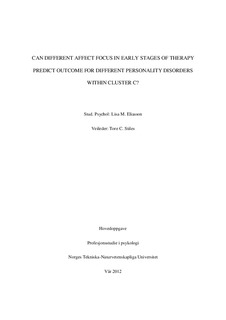Can different affect focus in early stages of therapy predict outcome for different personality disorders within cluster C?
Master thesis

View/
Date
2012Metadata
Show full item recordCollections
- Institutt for psykologi [2884]
Abstract
Objective: The study compared how specific affect focuses in early stages of treatment predict outcome (SCL-90) for specific cluster C personality disorders. Method: The sample consisted of patients with cluster C personality disorders from a randomized controlled trial comparing 40-sessions of short-term dynamic psychotherapy and cognitive psychotherapy. Thirty-one patients had an avoidant personality disorder (AVPD), 17 patients had an obsessive compulsive personality disorder (OCPD) and 10 had a dependent personality disorder (DPD). The Global Severity Index (GSI) of the SCL-90 was used as the outcome measure and the Achievement of Therapeutic Objective Scale (ATOS) was used as a process measure to rate patients affects in an early session (session 1 and 6). Results: The results indicated that focus on closeness and anger predicted outcome for AVPD, focus on positive feelings for self predicted outcome for OCPD and focus on grief predicted outcome for DPD. Conclusion: Specific affect focuses in early stages of treatment is significant for various cluster C personality disorders to predict outcome.